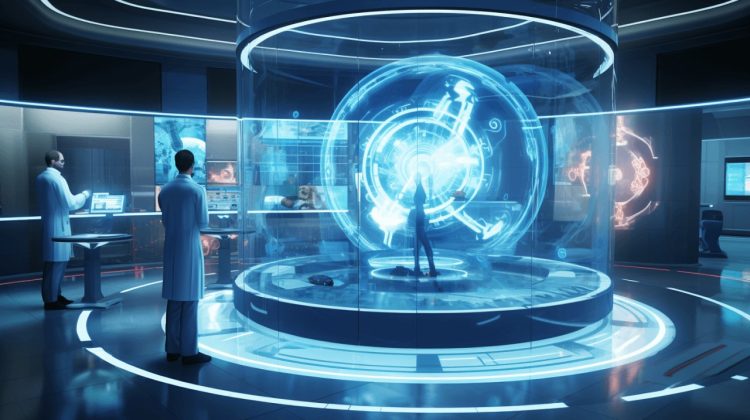Artificial intelligence (AI) has come a long way since its inception. Today, it is one of the most transformative forces across industries, revolutionizing sectors like healthcare, finance, entertainment, and more. At the core of this revolution are two technological innovations: deep learning and quantum computing. While deep learning has already made significant strides in reshaping AI’s capabilities, quantum computing presents the potential to push these boundaries even further. But what makes these innovations so pivotal, and how are they working together to redefine the future of AI? This article delves into the relationship between deep learning, quantum computing, and their role in reshaping AI.
Deep Learning: The Core of Modern AI
The Rise of Deep Learning
Deep learning, a subset of machine learning (ML), has become the driving force behind many AI breakthroughs in recent years. By mimicking the neural networks of the human brain, deep learning models—also known as artificial neural networks (ANNs)—are capable of learning from large datasets and making decisions or predictions with remarkable accuracy. What distinguishes deep learning from other ML models is its ability to automatically extract features and patterns from data, without requiring explicit feature engineering.
In its early stages, machine learning models struggled with tasks that involved unstructured data, such as images, audio, and text. Traditional machine learning algorithms relied heavily on manual feature extraction, which required domain expertise. However, deep learning changed the game by introducing multi-layered networks that could learn these features directly from the raw data, paving the way for AI systems to outperform humans in tasks like image classification, speech recognition, and even complex strategic games like Go.
Deep Learning in Action
The impact of deep learning on AI is profound. Some of the most common applications of deep learning today include:
- Computer Vision: Convolutional neural networks (CNNs) have revolutionized image and video recognition, enabling technologies like facial recognition, autonomous driving, and medical imaging analysis.
- Natural Language Processing (NLP): Recurrent neural networks (RNNs) and transformers, such as OpenAI’s GPT and Google’s BERT, have drastically improved machine translation, sentiment analysis, and chatbots.
- Speech Recognition: Deep learning models are integral to virtual assistants like Amazon Alexa, Google Assistant, and Apple’s Siri, allowing them to accurately transcribe and understand spoken language.
- Healthcare: In medical diagnostics, deep learning algorithms are being trained to detect anomalies in X-rays, MRIs, and other medical scans with greater accuracy than radiologists.
Challenges and Limitations of Deep Learning
Despite its successes, deep learning is not without challenges. These models require massive amounts of labeled data and computational resources, which can be a significant barrier for small organizations or research teams. Moreover, the “black-box” nature of deep learning models—where it’s difficult to explain why the model made a particular decision—raises concerns around interpretability, accountability, and trust, especially in critical applications like healthcare and finance.
Furthermore, deep learning models are prone to overfitting and often struggle with generalizing beyond the data they were trained on. This makes them vulnerable to adversarial attacks, where small perturbations in input data can cause dramatic changes in output, undermining the reliability of the model.
Quantum Computing: The Next Frontier
While deep learning has reached a remarkable level of maturity, there’s still room for growth. One of the most exciting areas that could propel AI to new heights is quantum computing. Though it is still in its early stages, quantum computing promises to revolutionize computing by solving problems that are currently intractable for classical computers.
What is Quantum Computing?
Quantum computing is based on the principles of quantum mechanics, which govern the behavior of particles at a subatomic level. Unlike classical computers, which use bits (either 0 or 1) to process information, quantum computers use qubits (quantum bits), which can exist in multiple states simultaneously due to a phenomenon called superposition. This ability to process multiple possibilities at once enables quantum computers to perform calculations at an exponentially faster rate than classical computers for certain types of problems.
Additionally, quantum computers leverage entanglement, a quantum phenomenon where the state of one qubit is directly correlated with the state of another, even if they are separated by vast distances. This property enables quantum systems to carry out complex computations with a level of parallelism that classical computers cannot match.
Quantum Computing’s Potential for AI
The intersection of quantum computing and AI could be a game-changer. Below are several ways in which quantum computing could impact AI development:
- Optimization Problems:
Many AI algorithms, especially those used for deep learning, involve optimization problems where the goal is to find the best possible solution from a large set of possibilities. Classical computers struggle with large-scale optimization problems due to the sheer number of possible solutions. Quantum computers, however, can process these problems more efficiently through quantum annealing and other quantum algorithms, potentially leading to faster training times for deep learning models. - Quantum Machine Learning (QML):
QML refers to the integration of quantum computing into machine learning algorithms. By leveraging quantum superposition and entanglement, QML has the potential to process high-dimensional data in ways that classical algorithms cannot. This could enable AI systems to learn from larger, more complex datasets, improving their predictive power and accuracy. - Quantum Neural Networks (QNNs):
The concept of quantum neural networks has gained significant attention. QNNs combine quantum computing and deep learning, enabling models to operate in quantum states that classical deep learning models cannot replicate. These networks have the potential to solve complex problems like pattern recognition and decision-making more efficiently than classical methods. - Data Storage and Security:
Quantum computing could also revolutionize data storage and encryption methods. Quantum encryption techniques, like quantum key distribution (QKD), promise to offer highly secure communication channels, which could be crucial for AI systems that rely on sensitive data.
The Challenges of Quantum Computing
While quantum computing holds immense potential, it is far from ready for widespread use in AI. The field is still in its infancy, with many technical hurdles to overcome. One of the biggest challenges is maintaining quantum coherence, which refers to the ability of qubits to stay in a quantum state long enough to perform meaningful computations. Current quantum computers are highly prone to errors and require extreme conditions, such as supercooled environments, to function.
Moreover, quantum algorithms for AI are still in the experimental phase. Although there have been promising breakthroughs, it will likely take several more years—or even decades—before quantum computing becomes a mainstream tool for AI research and development.

The Convergence of Deep Learning and Quantum Computing
The true potential of AI will likely emerge when deep learning and quantum computing converge. While deep learning algorithms have made significant strides in recent years, they still face limitations that quantum computing could help overcome.
Enhancing Deep Learning with Quantum Computing
Quantum computers have the potential to make deep learning models more powerful and efficient by:
- Speeding up Computations:
Quantum algorithms could significantly reduce the time required to train deep learning models. By optimizing high-dimensional data more effectively, quantum computers could help deep learning networks converge faster and require fewer resources. - Improving Model Accuracy:
Quantum computers may allow for better feature extraction from complex datasets, leading to more accurate models. This could be particularly beneficial in fields like drug discovery, where deep learning is used to analyze molecular structures and predict the efficacy of drugs. - Solving Complex Problems:
AI models often struggle with tasks that involve complex relationships, such as predicting stock market trends or simulating physical systems. Quantum computers could enable more advanced simulations, allowing AI systems to solve problems that were previously beyond their reach.
Collaborative Research: Deep Learning Meets Quantum Computing
Several research labs, both academic and corporate, are already working on hybrid models that combine quantum computing with deep learning. For instance, IBM, Google, and Microsoft are among the tech giants exploring quantum-enhanced machine learning. Additionally, quantum machine learning libraries like PennyLane and TensorFlow Quantum are already allowing developers to experiment with hybrid quantum-classical models.
The Future of AI: A Synergistic Approach
While we are still in the early stages of quantum computing, the possibilities it presents for AI are exciting. As both deep learning and quantum computing technologies continue to evolve, they will likely complement each other, with quantum computing enabling deep learning models to become faster, more efficient, and more accurate.
The key to success will be in the collaboration between researchers, technologists, and industry leaders, all working toward making these innovations accessible and usable for a wide range of applications. We are on the cusp of a new era in AI, where the boundaries of what’s possible are expanding rapidly, thanks to the convergence of deep learning and quantum computing.
Conclusion
In conclusion, deep learning and quantum computing are two pillars of modern artificial intelligence that are reshaping the field in profound ways. Deep learning has already transformed many industries, while quantum computing promises to push the limits of AI even further by solving problems that were previously out of reach. The future of AI looks bright, and the ongoing collaboration between these two technologies will undoubtedly lead to the next wave of AI advancements, offering new possibilities that were once confined to science fiction.
As we look ahead, the synergy between deep learning and quantum computing could unlock a future where AI systems are not only more intelligent but also faster, more efficient, and capable of solving the most complex challenges facing humanity.











































